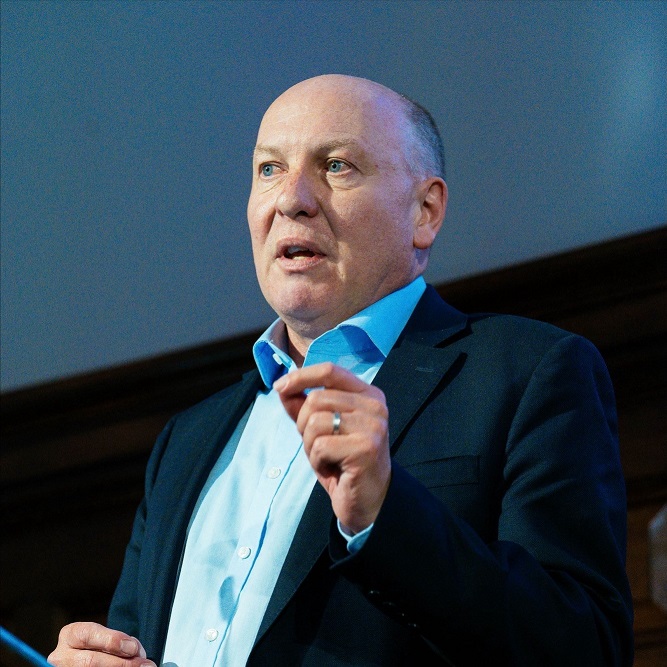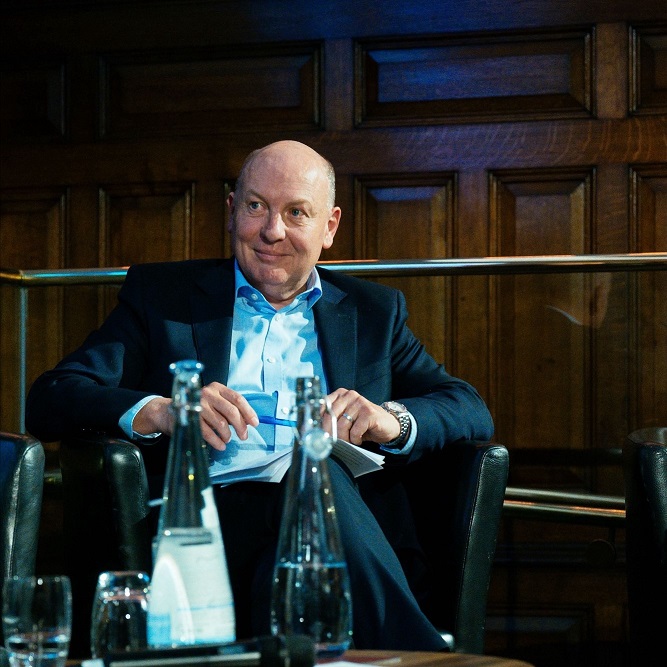National Energy System Operator (NESO) launches on 1 October
13 Sep 2024 - 2 minute read

20 Sep 2024 - 9 minute read
At the 2024 Energy UK conference, our Executive Director, Fintan Slye addressed the audience and outlined how clean power by 2030 is achievable and gave an update on how we’ll collaborate with the energy industry as the National Energy System Operator (NESO) to deliver this.
Below, you can read Fintan’s full speech from the event.
I wonder if anyone in the audience knows the relevance of the number behind me? As much as I’d like it to be, it’s not Ireland’s chance of winning the 2026 World Cup. But it is something incredible - it’s the current record for operating the electricity system at zero carbon in Great Britain, which was achieved earlier this year.
At ESO, this number means a lot to us, and hopefully it means a lot to everyone in this room, because it shows that when the energy industry works together, when we are focused, when we prioritise innovation and competition, when we do things differently, we can deliver the seemingly impossible.
And what I’m here to talk to you about today is exactly that – doing things differently. As many of you will already know, in exactly two weeks’ time, today’s Electricity System Operator will take a transformational step forward to become tomorrow’s National Energy System Operator serving all of Great Britain …. and that’s not just a change of logo or the adding of an ‘N’ – it is a complete reorientation of what we do and how we do it. But before I get to that I think that it is helpful, it you will indulge me for 2 minutes, to understand a little bit of the context of how we got here.
30 years ago, Great Britain was running on fossil fuels, where a small number of large power stations served the needs of society and the economy. That way of life continued for some time as Great Britain moved through the ups and downs of economic growth. But history tells us that Great Britain has always been an innovator - that it doesn’t like to stand still - and so it was during the early 2000s that Britain decided to do things differently by taking a globally leading role in decarbonisation.
I know many people in the room today were a part of that change and let’s be honest – it wasn’t easy. It required transformational changes to the electricity market that received a lot of pushback, it needed bold Government and regulatory support and a risk appetite that embraced new renewable technologies, alongside an energy sector that worked together and delivered real progress.
Now I’m not here to give you a history lesson – so let’s fast forward to the present day – in August this year fossil fuels were less than 20% of our generation mix – an incredible transformation. What that means is that Great Britain is now home to one of the fastest decarbonising economies in the world. But there is more, much more, that needs to be done to get to a clean power system – especially if we are to deliver that by 2030.

For everyone in this room, the last couple of years will no doubt have felt like an all-out sprint as we have overcome the challenges presented by two global crises – first the pandemic then the energy crisis due to Putin’s illegal invasion of Ukraine.
From this period there are two things I would highlight here – first when required we, as an industry working together, can do things differently and in timescales previously thought impossible and second it is possible to mobilise the demand side and it can, should, and indeed must, play an important role in the energy transition.
A great example of this is the Demand Flexibility Service brought in in 2022 as part of tackling the energy crisis where Electricity System Operator worked with major energy players on options to deliver a world leading service that paved the way for millions of domestic consumers to engage with flexibility for the very first time. Not only did our collective actions keep the electricity system secure at a time of significant stress, but we showcased the power of the demand side in flexibility - pushing something that felt impossible into the mainstream.
I know that delivering the Demand Flexibility Service doesn’t mean we’ve got everything right and I’d be the first to admit that sometimes it has been pretty bumpy along the way.
But we are listening. We know that we must work with you to do more to unlock the power of flexibility, of smaller assets and of consumer participation and we’ve been open and about the scale of the challenge to accelerate grid connections across Great Britain and we’ve tried to be transparent and collaborative about the actions we can employ together as solutions. And it is with a focus on openness, transparency, and collaboration that we intend to begin our journey as Great Britain’s National Energy System Operator in exactly two weeks’ time.
Now I’m anticipating people are asking questions about why NESO is different and what it’s about. It isn’t just about one company & purpose, two licences, three statutory duties, four offices, five roles, six strategic priorities, seven layers of cyber defence, eight areas of activity […… and a partridge in a pear tree]
Nor is it just one distinguished Chair, one outstanding COO, one brilliant Chief Engineer, one network planning team, one function nor one department.
NESO is in fact special because it brings all of this together - it joins up previously siloed thinking and enables a whole system approach and it is open and transparent as engages across our entire energy ecosystem as we look to help consumers, society and the economy navigate the transition to clean sustainable energy, that is safe, secure and reliable in a way that is affordable and fair for all.
And right now, we are taking the first steps as we work on our advice to the Government on achieving Clean Power by 2030.
I understand that some people in the room and out there will be saying it’s not possible or it’s too difficult. But I’m happy to stand here today and say that our analysis says that it is possible to achieve Clean Power by 2030. It will undoubtedly be challenging, and it will undoubtedly need us to do this differently – but it definitively is possible.
This isn’t me drinking the Kool-Aid – this is teams of people doing the detailed analysis and engaging with stakeholders. But it’s not going to be easy. It’s going to be a Herculean effort. Whether it’s delivering first-of-a-kind technology, speeding up the planning system or looking differently at the regulatory approval process, we’re all going to have to do things in ways that haven’t been done before, in timeframes that are significantly shorter than we might have envisaged just a couple of years ago.
But getting this right is important - I and everyone at NESO know that Britain can only be Great if it can grow. And to grow it needs secure, affordable and sustainable power. Power to meet the demands of data centres that carry the information we use; power to drive new and existing businesses that will create jobs across Britain; power for people in their homes to enable them to do the things they want to do – when they want to do them.
What gives me hope about all of this is that in a short space of time, I’ve seen clean power technology move on significantly; batteries are mainstream, hydrogen and carbon capture and storage are getting closer to being commercial; we’re seeing huge advances in A.I. and digital technologies; and we’re enabling greater levels of demand side flexibility. Just last month, we finished another round of trails where 1,700 EVs contributed flexibility to help manage the system. And this is just the start…
….. as I said earlier, we’ve achieved great things together already – but for Clean Power by 2030, we’re going to have to move and do it quicker.

I want you all to take a second and fast forward just one year to 2025. I fully expect that during next year the electricity system will operate at zero carbon for periods of time – short periods at first, but as more clean technology commissions these periods will grow. Only five years ago when we set out to achieve this, there was significant scepticism that such a transformation could happen, we had only just delivered the milestone of operating for a single day without coal on the system – to move to operating totally zero carbon for periods seemed, at least to some, fantastical. But it is now within touching distance – we are already at over 90% - and 100% will be delivered next year.
We have all seen repeated examples of how the industry can respond and adapt to challenges. But let’s be honest, that is not the standard or the norm. Usually things take time, an awful lot of time – whether it is code reform or infrastructure delivery or connection lead times or market change or technology roll-out – as was said earlier there is a lot of treacle, and my experience is the treacle fights back.
So, make no mistake, Clean Power 2030 is achievable, but it is also a huge challenge and requires us to do things differently, to do things quicker, to act together and importantly to act with urgency now.
So, you’ll all be pleased to know I’m coming to the end of my speech here, but there are two things I want you to walk away with.
First, in just two weeks NESO will be established – it will bring together the essential building blocks to help Great Britain deliver on its ambitious energy agenda – not just the near-term mission of clean power by 2030 but also the broader energy transition to net zero by 2050 in a way the ensures secure, reliable, and affordable energy supplies for all.
We cannot do this without you – this is a huge undertaking. For NESO to succeed it must engage with, and deliver for, all of you, and for society and the economy. It does not exist in either a vacuum or an ivory tower – it exists to serve its customers - those who rely on the services it provides – be they in the energy industry, consumers, businesses, communities, or anyone in-between.
Second - Great Britain has made incredible progress in decarbonisation but there is still a huge amount for us to do to achieve Clean Power by 2030 and a net zero economy by 2050. It is absolutely possible, and we are committed to playing our part, but it requires all of us to do things differently, to act together and to act with urgency now.
This is a huge ask…and I really hope you’re going to come with us on this journey because together I firmly believe that we can achieve great things.
Thank you.
Read how we’re providing key advice on how GB can achieve clean power by 2030